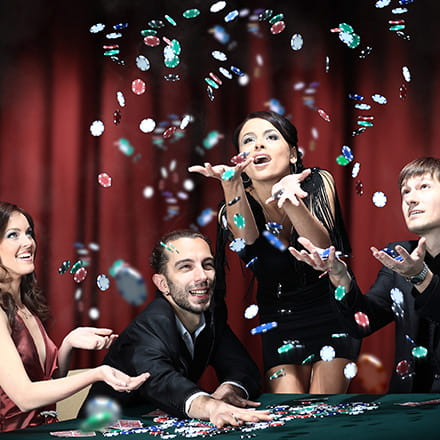
Gambling games have enthralled players for centuries, pulling them into a universe of thrill, luck, and wealth. From the flashing lights of slot machines to the strategic action of poker tables, these games offer a unique blend of fun and hazard. However, below the surface of this glitz and glamour lies a intricate relationship of calculations that determines every outcome and action made within the casino.
Comprehending this connection between casino games and numerical principles merely boosts the gambling experience but can also help participants make knowledgeable choices. Whether you are a recreational gambler or a passionate follower, recognizing the math concepts at play can provide insightful understandings into likelihood, probabilities, and tactics, ultimately influencing how one deals with these games of luck.
Mathematical Likelihood in Gambling
In the realm of gambling activities, statistical likelihood plays a crucial role in determining results and guiding player decisions. Each game has a unique set of rules and a specific likelihood model that affects its dynamics. For instance, in activities like the roulette wheel, players must understand the chances of landing a specific number or shade. The probability of specific events occurring can be assessed, and this understanding can greatly influence wagering strategies.
Players also need to be aware of the casino edge, which is the statistical benefit that casinos hold over gamblers in the long term. This advantage differs across different games. In blackjack, expert players can use strategies to lower the casino advantage to as low as one percent, while in games like slot machines, the house edge can be significantly greater. Understanding the house edge allows players to make wise choices about which games to play and the amount to bet.
Furthermore, likelihood is fundamental in the principle of risk versus gain in gambling. Each wager carries a particular risk factor, and players must evaluate the possible return against that risk. Activities like poker require players to not only calculate the odds of their own showing winning but also to assess the probabilities of their rivals’ hands. By applying mathematical principles to their gameplay, gamblers can enhance their odds of winning and participate more effectively in the exciting realm of casino games.
Expected Value in Casino Games
When talking about casino activities, one of the basic concepts rooted in math is the anticipated value. This statistical measure assists players grasp the possible results of their wagers over a period. In simple terms, expected value (EV) calculates the mean amount a player can expect to gain or suffer per wager if they were to play the game repeatedly. Each game has its unique EV, affected by the probabilities and the house edge, which indicates the advantage that the gambling establishment holds.
For example, think of a activity like roulette. The expected worth can be calculated based on the particular wager placed. If a gambler bets on a individual number, the return is 35 to 1, but the true odds of winning that bet are 1 in 37 (in Euro roulette). This leads in a detrimental anticipated worth, indicating that, on average, players will lose money over a period when playing this type of wager. Understanding this idea allows gamblers to make more informed decisions about which games and bets may be less advantageous.
Additionally, the investigation of expected worth can lead to improved bankroll management. Gamblers who comprehend the mathematics behind their activities are often able to set realistic goals. By acknowledging their possible deficits and profits, they can adjust their playing strategies accordingly, which may improve their total gambling experience. As a result, expected value serves as a critical tool for both novice and seasoned gamblers to steer through the often volatile character of gambling activities.
Tactics and Odds: The Math Behind Winning
In casino games, grasping the chances is vital for participants seeking to boost their opportunities of success. Each contest has its own specific set of odds that dictate winning outcomes, and these statistics are often presented in the rules of the game regulations or payout schedules. For instance, in games like 21, gamblers can improve their chances through strategies such as tracking cards, which relies on mathematical principles to gain an upper hand over the house. non Gamstop casinos By familiarizing themselves with the probabilities, players can make more educated decisions on when to wager and when to quit.
Furthermore, the idea of expected value plays a significant part in casino strategies. Expected value determines the average outcome of a stake over a period, allowing gamblers to evaluate whether a certain stake is valuable taking. For instance, video slots have a set payout percentage, which can suggest the expected payout a participant can anticipate on their bets. By choosing games with higher payout percentages, participants can minimize the house edge, boosting their possible rewards in the over time.
In conclusion, successful players often adopt a blend of chance and math strategy to improve their gaming experience. While luck is unpredictable, managing a wagering approach based on calculative ideas can lead to more positive results. By utilizing techniques such as bankroll management and game selection, players can leverage mathematics to navigate the random nature of casino games, making the most of their time and resources at the gaming tables.
